Cylinder Head -- Installation |
- NOTICE:
- When replacing the injectors (including shuffling the injectors between the cylinders), common rail or cylinder head, it is necessary to replace the injection pipes with new ones.
- When replacing the fuel supply pump, common rail, cylinder block, cylinder head, cylinder head gasket or timing gear case, it is necessary to replace the fuel inlet pipe with a new one.
- After removing the injection pipes, clean them with a brush and compressed air.
| 1. INSTALL CYLINDER HEAD GASKET |
Check the piston protrusions for each cylinder.
Clean the cylinder block with solvent.
Set the piston of the cylinder to be measured to slightly before TDC.
Text in Illustration *1 Measuring Tip *2 Protrusion Place a dial indicator on the cylinder block, and position the measuring tip as shown in the illustration.
Set the dial indicator at 0 mm (0 in.)
- HINT:
- Make sure that the measuring tip is square to the cylinder block gasket surface and piston head when taking the measurements.
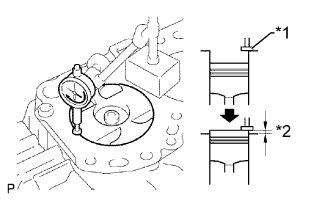 |
Find where the piston head protrudes most by slowly turning the crankshaft clockwise and counterclockwise.
Measure the piston protrusion of each cylinder at the 2 points shown in the illustration.
Text in Illustration *1 Measuring Point
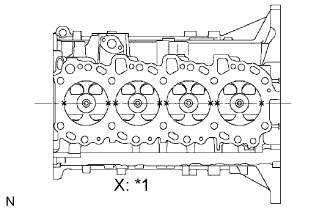 |
For the piston protrusion value of each cylinder, use the average of the 2 measurements of each cylinder.
- Standard piston protrusion:
- 0.005 to 0.254 mm (0.000197 to 0.0100 in.)
- HINT:
- When installing the piston and connecting rod assembly, if the protrusion is not as specified, remove the piston and connecting rod assembly and reinstall them.
Select a new cylinder head gasket.
Text in Illustration *1 Cutout Mark - HINT:
- New cylinder head gaskets are available in 5 sizes, and are marked A, B, C, D or E.
- New Cylinder Head Gasket Thickness:
Mark Specified Condition A 0.80 to 0.90 mm (0.0315 to 0.0354 in.) B 0.85 to 0.95 mm (0.0335 to 0.0374 in.) C 0.90 to 1.00 mm (0.0354 to 0.0394 in.) D 0.95 to 1.05 mm (0.0374 to 0.0413 in.) E 1.00 to 1.10 mm (0.0394 to 0.0433 in.)
Select the largest piston protrusion value from the measurements made. Then select a new appropriate gasket according to the table below.
- Gasket Size:
Item Specified Condition Piston protrusion 0.005 to 0.054 mm (0.000197 to 0.00213 in.) 0.055 to 0.104 mm (0.00217 to 0.00409 in.) 0.105 to 0.154 mm (0.00413 to 0.00606 in.) 0.155 to 0.204 mm (0.00610 to 0.00803 in.) 0.205 to 0.255 mm (0.00807 to 0.0100 in.) Gasket to be used A B C D E
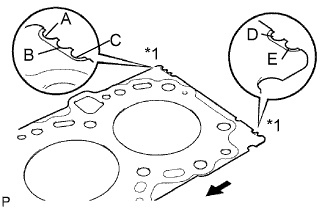 |
Place the cylinder head on the cylinder block.
Text in Illustration 
Front - NOTICE:
- Make sure the gasket is installed facing the proper direction.
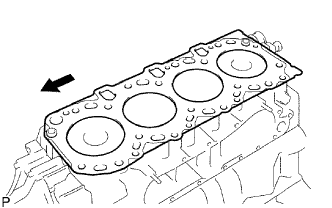 |
| 2. INSTALL CYLINDER HEAD SUB-ASSEMBLY |
- HINT:
- The cylinder head bolts are tightened in 3 progressive steps.
- If any bolt is broken or deformed, replace it.
Place the cylinder head on the cylinder head gasket.
Apply a light coat of engine oil to the threads and under the heads of the cylinder head bolts.
Install and uniformly tighten the 18 cylinder head bolts and 18 washers in several passes in the sequence shown in the illustration.
- Torque:
- 85 N*m{867 kgf*cm, 63 ft.*lbf}
If any of the cylinder head bolts does not meet the torque specification, replace it.Standard Bolt Length Item Specified Condition A 110 mm (4.33 in.) B 167 mm (6.57 in.)
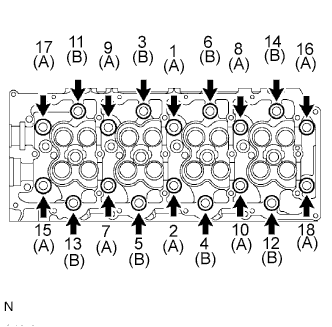 |
Mark the front of each cylinder head bolt with paint.
Text in Illustration *1 Painted Mark *a Front
 |
Further tighten the cylinder head bolts by 90° in the sequence shown in the illustration.
Finally, tighten the cylinder head bolts by an additional 90°.
Check that the painted mark are now facing rearward.
| 3. INSTALL VALVE LIFTER |
Install the valve lifters.
Check that each valve lifter rotates smoothly by hand.
| 4. INSTALL CAMSHAFT |
Using the crankshaft pulley bolt, set the No. 1 cylinder to 90° BTDC/compression.
Text in Illustration *1 Key - HINT:
- Set the No. 1 cylinder to 90° BTDC/compression to prevent the top of the piston from hitting against the valve head.
 |
Install the camshaft.
Apply engine oil to the thrust portion of the camshaft.
Place the camshaft on the cylinder head with the key groove facing upward.
Text in Illustration *1 Key Groove *a Upward Align the timing marks (1-dot marks) of the camshaft drive and driven main gears and set the No. 2 camshaft in place.

 |
Remove any old seal packing (FIPG material) from the camshaft bearing cap.
Apply seal packing to the specified areas shown in the illustration.
- Seal packing:
- Toyota Genuine Seal Packing Black, Three Bond 1207B or equivalent
- Standard seal diameter:
- 4 mm (0.157 in.)
Text in Illustration *1 Seal Packing *2 Oil Passage - NOTICE:
- Do not allow seal packing to contact the oil passage of the bearing cap.
- After applying seal packing, install the camshaft bearing caps within 3 minutes and tighten the bolts within 15 minutes.
- Do not start the engine for at least 2 hours after installation.
 |
Install the 5 bearing caps to their proper locations.
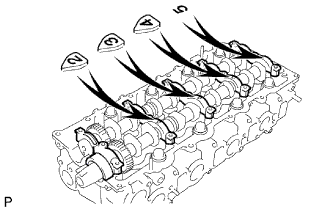 |
Apply a light coat of engine oil to the threads and under the heads of the bearing cap bolts.
 |
Install and uniformly tighten the 15 bearing cap bolts in several passes in the sequence shown in the illustration.
- Torque:
- 19 N*m{194 kgf*cm, 14 ft.*lbf}
Install a new camshaft oil seal.
Apply MP grease to the lip of a new oil seal.
Using SST and a hammer, tap in the oil seal until its surface is flush with the surfaces of the camshaft bearing cap and cylinder head.
- SST
- 09608-06041
 |
| 5. INSTALL CYLINDER BLOCK INSULATOR |
Install the cylinder block insulator to the cylinder head.
| 6. INSTALL NO. 2 TIMING BELT COVER |
Apply seal packing (FIPG) to the specified areas shown in the illustration.
- Seal packing:
- Toyota Genuine Seal Packing Black, Three Bond 1207B or equivalent
Text in Illustration *1 Seal Packing - NOTICE:
- After applying FIPG, install the No. 2 timing belt cover within 3 minutes and tighten its bolts and nut within 15 minutes.
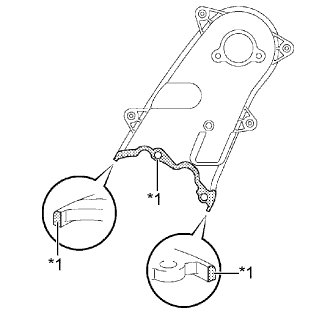 |
Clean the bolts and their holes.
Apply adhesive to 2 or 3 threads at the end of each of the 4 bolts.
- Adhesive:
- Toyota Genuine Adhesive 1324, Three Bond 1324 or equivalent
Install the No. 2 timing belt cover with the 4 bolts and nut.
- Torque:
- 10 N*m{102 kgf*cm, 7 ft.*lbf}
| 7. INSTALL CAMSHAFT TIMING PULLEY |
Install the camshaft timing pulley.
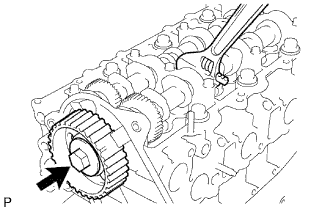 |
Fasten the bolt of the camshaft timing pulley by holding the camshaft with a wrench.
- Torque:
- 98 N*m{1000 kgf*cm, 72 ft.*lbf}
| 8. INSTALL TIMING BELT |
| 9. INSPECT AND ADJUST VALVE CLEARANCE |
| 10. INSTALL EXHAUST MANIFOLD |
Temporarily install a new gasket, the exhaust manifold, 8 new collars and the 8 plate washers to the cylinder head with 8 new nuts.
Tighten the 8 nuts in the order shown in the illustration.
- Torque:
- 40 N*m{408 kgf*cm, 30 ft.*lbf}
- NOTICE:
- Make sure that the side of the collar with the smaller diameter faces the exhaust manifold.
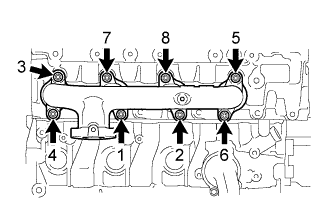 |
| 11. INSTALL NO. 1 COMPRESSOR MOUNTING BRACKET |
Install the No. 1 compressor mounting bracket with the 4 bolts.
- Torque:
- 45 N*m{459 kgf*cm, 33 ft.*lbf}
| 12. CONNECT COOLER COMPRESSOR ASSEMBLY |
Connect the cooler compressor with the 4 bolts.
- Torque:
- 25 N*m{250 kgf*cm, 18 ft.*lbf}
| 13. INSTALL FAN SHROUD |
| 14. INSTALL TURBOCHARGER SUB-ASSEMBLY |
| 15. INSTALL COMMON RAIL ASSEMBLY |
| 16. INSTALL INJECTOR ASSEMBLY |
| 17. INSTALL GLOW PLUG ASSEMBLY |
| 18. INSTALL INTAKE MANIFOLD |
| 19. ADD ENGINE OIL |
Add new engine oil.
- Standard Oil Grade:
Oil Grade Oil Viscosity (SAE) G-DLD1, API CF-4 or CF
(You may also use API CE or CD)- 5W-30
- 10W-30
- 15W-40
- 20W-50
- Standard Capacity:
Item Specified Condition Drain and refill without oil filter change 6.6 liters (7.0 US qts, 5.8 Imp. qts) Drain and refill with oil filter change 6.9 liters (7.3 US qts, 6.1 Imp. qts) Dry fill 7.4 liters (7.8 US qts, 6.5 Imp. qts)
Install the oil filler cap.
| 20. CONNECT CABLE TO NEGATIVE BATTERY TERMINAL |
- NOTICE:
- When disconnecting the cable, some systems need to be initialized after the cable is reconnected (Toyota Fortuner RM000004W63000X.html).
| 21. BLEED AIR FROM FUEL SYSTEM |
Using the hand pump mounted on the fuel filter cap, bleed the air from the fuel system. Continue pumping until the pump resistance increases.
- NOTICE:
- Hand pump pumping speed: Max. 2 strokes/ sec.
- The hand pump must be pushed with a full stroke during pumping.
- When the fuel pressure at the supply pump inlet port reaches a saturated pressure, the hand pump resistance increases.
- If pumping is interrupted during the air bleeding process, fuel in the fuel line may return to the fuel tank. Continue pumping until the hand pump resistance increases.
- If the hand pump resistance does not increase despite consecutively pumping 200 times or more, there may be a fuel leak between the fuel tank and fuel filter, the hand pump may be malfunctioning, or the vehicle may have run out of fuel.
- If air bleeding using the hand pump is incomplete, the common rail pressure does not rise to the pressure range necessary for normal use, and the engine cannot be started.
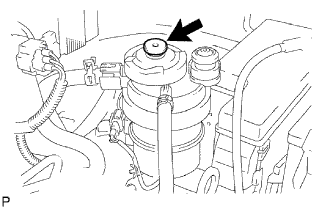 |
Check if the engine starts.
- NOTICE:
- Even if air bleeding using the hand pump has been completed, the starter may need to be cranked for 10 seconds or more to start the engine.
- Do not crank the engine continuously for more than 20 seconds. The battery may be discharged.
- Use a fully-charged battery.
When the engine can be started, proceed to the next step.
If the engine cannot be started, bleed the air again using the hand pump until the hand pump resistance increases (refer to the procedures above). Then start the engine.
Turn the ignition switch off.
Connect the intelligent tester to the DLC3.
Turn the ignition switch to ON and turn the intelligent tester on.
Clear the DTCs (Toyota Fortuner RM000000PDK0TWX.html).
Start the engine.*1
Enter the following menus: Powertrain / Engine and ECT / Active Test / Test the Fuel Leak.*2
Text in Illustration *a Reference
(Active Test Operation)
 |
Perform the following test 5 times with on/off intervals of 10 seconds: Active Test / Test the Fuel Leak.*3
Allow the engine to idle for 3 minutes or more after performing the Active Test for the fifth time.

- HINT:
- When the Active Test "Test the Fuel Leak" is used to change the pump control mode, the actual fuel pressure inside the common rail drops below the target fuel pressure when the Active Test is off, but this is normal and does not indicate a pump malfunction.
Enter the following menus: Powertrain / Engine and ECT / DTC.
Read Current DTCs.
Clear the DTCs (Toyota Fortuner RM000000PDK0TWX.html).
- HINT:
- It is necessary to clear the DTCs, as DTC P1604 or P1605 may be stored when air is bled from the fuel system after replacing or repairing fuel system parts.
Repeat steps *1 to *3.
Enter the following menus: Powertrain / Engine and ECT / DTC.
Read Current DTCs.
- OK:
- No DTCs are output.
| 22. ADD ENGINE COOLANT |
Tighten the radiator drain cock plug by hand.
Tighten the cylinder block drain cock plug.
- Torque:
- 8.0 N*m{82 kgf*cm, 71 in.*lbf}
Fill the radiator with TOYOTA Super Long Life Coolant (SLLC) to the B line of the radiator reservoir.
- Standard capacity:
- 9.8 liters (10.4 US qts, 8.6 Imp. qts)
- NOTICE:
- Never use water as a substitute for engine coolant.
- HINT:
- TOYOTA vehicles are filled with TOYOTA SLLC at the factory. In order to avoid damage to the engine cooling system and other technical problems, only use TOYOTA SLLC or similar high quality ethylene glycol based non-silicate, non-amine, non-nitrite, non-borate coolant with long-life hybrid organic acid technology (coolant with long-life hybrid organic acid technology consists of a combination of low phosphates and organic acids).
- Please contact your TOYOTA dealer for further details.
Press the inlet and outlet radiator hoses several times by hand, and then check the level of the coolant.
If the coolant level drops below the B line, add TOYOTA SLLC to the B line.
Install the radiator reservoir cap.
Using a wrench, install the vent plug.
- Torque:
- 2.0 N*m{20 kgf*cm, 17 in.*lbf}
Bleed air from the cooling system.
Warm up the engine until the thermostat opens. While the thermostat is open, circulate the coolant for several minutes.
Maintain the engine speed at 2500 to 3000 rpm.
Press the inlet and outlet radiator hoses several times by hand to bleed air.
- CAUTION:
- When pressing the radiator hoses:
- Wear protective gloves.
- Be careful as the radiator hoses are hot.
- Keep your hands away from the radiator fan.
Stop the engine and wait until the coolant cools down to ambient temperature.
- CAUTION:
- Do not remove the radiator reservoir cap while the engine and radiator are still hot. Pressurized, hot engine coolant and steam may be released and cause serious burns.
After the coolant cools down, check that the coolant level is at the F line.
If the coolant level is below the F line, add TOYOTA SLLC to the F line.
| 23. INSPECT FOR COOLANT LEAK |
- CAUTION:
- Do not remove the radiator reservoir cap while the engine and radiator are still hot. Pressurized, hot engine coolant and steam may be released and cause serious burns.
- NOTICE:
- Before each inspection, turn the A/C switch off.
Fill the radiator with coolant and attach a radiator cap tester.
Warm up the engine.
Using the radiator cap tester, increase the pressure inside the radiator to 118 kPa (1.2 kgf/cm2, 17 psi), and check that the pressure does not drop.
If the pressure drops, check the hoses, radiator and water pump for leaks. If no external leaks are found, check the heater core, cylinder block and head.
| 24. INSPECT FOR OIL LEAK |
Start the engine. Make sure that there are no oil leaks from the areas that were worked on.
| 25. INSPECT FOR FUEL LEAK |
- CAUTION:
- During Active Test mode, the engine speed becomes high and the combustion noise becomes loud, so pay attention.
- During Active Test mode, the fuel pressure becomes high. Be extremely careful not to expose your eyes, hands, or body to escaping fuel.
Check that there are no leaks from any part of the fuel system when the engine is stopped. If there is fuel leakage, repair or replace parts as necessary.
Start the engine and check that there are no leaks from any part of the fuel system. If there is fuel leakage, repair or replace parts as necessary.
Disconnect the return hose from the common rail.
Start the engine and check for fuel leaks from the return pipe.
If there is fuel leakage, replace the common rail.
Connect the intelligent tester to the DLC3.
Start the engine and push the intelligent tester main switch on.
Select the Fuel Leak test from the Active Test mode on the intelligent tester.
If the intelligent tester is not available, fully depress the accelerator pedal quickly. Increase the engine speed to the maximum and maintain that speed for 2 seconds. Repeat this operation several times.
Check that there are no leaks from any part of the fuel system.
- NOTICE:
- A return pipe leakage of less than 10 cc (0.6 cu in.) per minute is acceptable.
Reconnect the return hose to the common rail.
| 26. INSPECT FOR EXHAUST GAS LEAK |
| 27. INSPECT ENGINE OIL LEVEL |
Warm up the engine, stop the engine and wait 5 minutes. The engine oil level should be between the dipstick low level mark and full level mark.
If low, check for leakage and add oil up to the full level mark.- NOTICE:
- Do not fill engine oil above the full level mark.